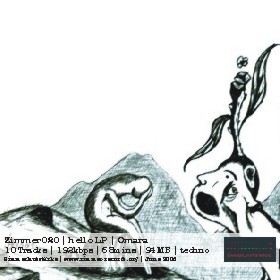Zimmer020 – Omara – Hello LP (Germany)
mp3, 192kbps, stereo, minimal, techno, trance
020.01 – omara – hello
020.02 – omara – konnichiwa
020.03 – omara – bon jorno
020.04 – omara – john porno
020.05 – omara – gruetzi
020.06 – omara – buenas dias
020.07 – omara – namaste
020.08 – omara – dobar den
020.09 – omara – bonsoir
020.10 – omara – servus
download & stream -> archive.org
download & stream -> sonicsquirrel.net
download & stream -> last.fm
download ZIP (MP3 | 94MB)
Artwork (666px)
[by nadrealizam]
According to the Oxford English Dictionary, hello is an alteration of hallo, hollo, which came from Old High German “halâ, holâ, emphatic imperative of halôn, holôn to fetch, used especially in hailing a ferryman.” It also connects the development of hello to the influence of an earlier form, holla, whose origin is in the French holà (roughly, ‘whoa there!’, from French là ‘there’). As in addition to hello, halloo, hallo, hollo, hullo and (rarely) hillo also exist as variants or related words, the word can be spelt using any of all five vowels.
The use of hello as a telephone greeting has been credited to Thomas Edison; according to one source, he expressed his surprise with a misheard Hullo. Alexander Graham Bell initially used Ahoy (as used on ships) as a telephone greeting. However, in 1877, Edison wrote to T.B.A. David, the president of the Central District and Printing Telegraph Company of Pittsburgh:
Friend David, I do not think we shall need a call bell as Hello! can be heard 10 to 20 feet away.
What you think? Edison – P.S. first cost of sender & receiver to manufacture is only $7.00.
By 1889, central telephone exchange operators were known as ‘hello-girls’ due to the association between the greeting and the telephone.
Hello may be derived from hullo, which the American Merriam-Webster dictionary describes as a “chiefly British variant of hello,” and which was originally used as an exclamation to call attention, an expression of surprise, or a greeting. Hullo is found in publications as early as 1803. The word hullo is still in use, with the meaning hello. //wikipedia
